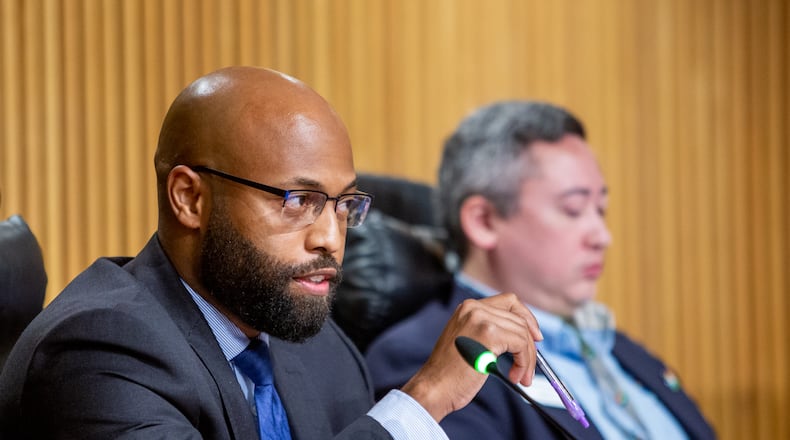Gwinnett County officials held off Tuesday on formally reducing the penalties for possession of small amounts of marijuana.
County officials are discussing a change to the county’s ordinance that could carry no jail time and lower fines for anyone caught with an ounce or less of the drug. But the Board of Commissioners unanimously voted to table a vote on the amendment until their Nov. 2 meeting.
State law dictates that anyone found in possession of an ounce or less of marijuana can face up to one year in jail, a $1,000 fine or a year’s worth of community service. The proposed ordinance rewrite would cap fines at $150 and community service at 20 hours for anyone found guilty.
Though possession of a small amount remains a misdemeanor crime in Georgia, individual cities and counties around the state have partially decriminalized the offense by setting their own penalties.
Under the proposed change, anyone found with an ounce or less of the drug could receive a citation for violating the county ordinance rather than facing arrest for a criminal misdemeanor violation, said Gwinnett Commissioner Kirkland Carden.
“In no way, shape or form am I promoting the use of marijuana,” Carden said. “It’s still illegal; it’s still a crime. But I think we should be smarter and take a more holistic approach about how we enforce our drug policy.”
Carden, who has spearheaded the call for a change to the ordinance, said the county needs to focus its resources on serious crimes that directly affect residents’ quality of life. He said he’s disappointed with the tabling of the ordinance after discussing it for months.
Clarkston led the charge in 2016 to lower marijuana possession penalties. More than a dozen Georgia cities and counties have enacted similar ordinances since, including Atlanta, Augusta-Richmond County, Chamblee, Doraville, Fulton County and to the south, Savannah, Chatham County and Tybee Island.
The county’s ordinance currently aligns with state law. It causes the police department to “expend valuable resources in connection with the arrest, processing and transport to jail of those persons accused of violating this ordinance,” said County Attorney Mike Ludwiczak during a Tuesday work session meeting.
The ordinance update would also permit judges to require violators to attend an educational class on drugs or enter a treatment program.
Stricter punishments not only put more people in jail, but can hurt their employment and housing options down the road. They also have been found to disproportionately affect communities of color.
“If a young person has a problem with substance abuse, I think the appropriate thing to do is get them some kind of course or treatment to address that,” Carden said. “Locking them up and making them pay a $1,000 fine may not be the best way to address that problem.”
If the commission approves the change to its laws, authorities could still opt to charge anyone found with an ounce or less under the state’s more stringent law, Ludwiczak said.
The ordinance change would bring the written law in line with the practice already being carried out by Gwinnett County Solicitor-General Brian Whiteside, who currently does not prosecute individuals for an ounce or less of marijuana, Carden said.
Whiteside did not immediately respond to The Atlanta Journal-Constitution’s requests Tuesday for comment. In August 2019, he announced his office would no longer prosecute marijuana misdemeanor cases. The Gwinnett County Police Department followed suit, announcing it would no longer write tickets or arrest anyone caught with an ounce or less.
The county tabled Tuesday’s vote to give commissioners more time to discuss the the ordinance with Whiteside, the county’s recorder’s court and other community stakeholders, Ludwiczak said.
“We aren’t saying no, we’re saying not right now,” said County Commission Chairwoman Nicole Love Hendrickson in an email. “It’s important we are proactive in our changing environment. At the heart of it all we don’t want people to carry the weight/unnecessary stigma of having a criminal history. At the end of the day, we want to be intentional about putting a sound policy in place.”
About the Author
Keep Reading
The Latest
Featured


